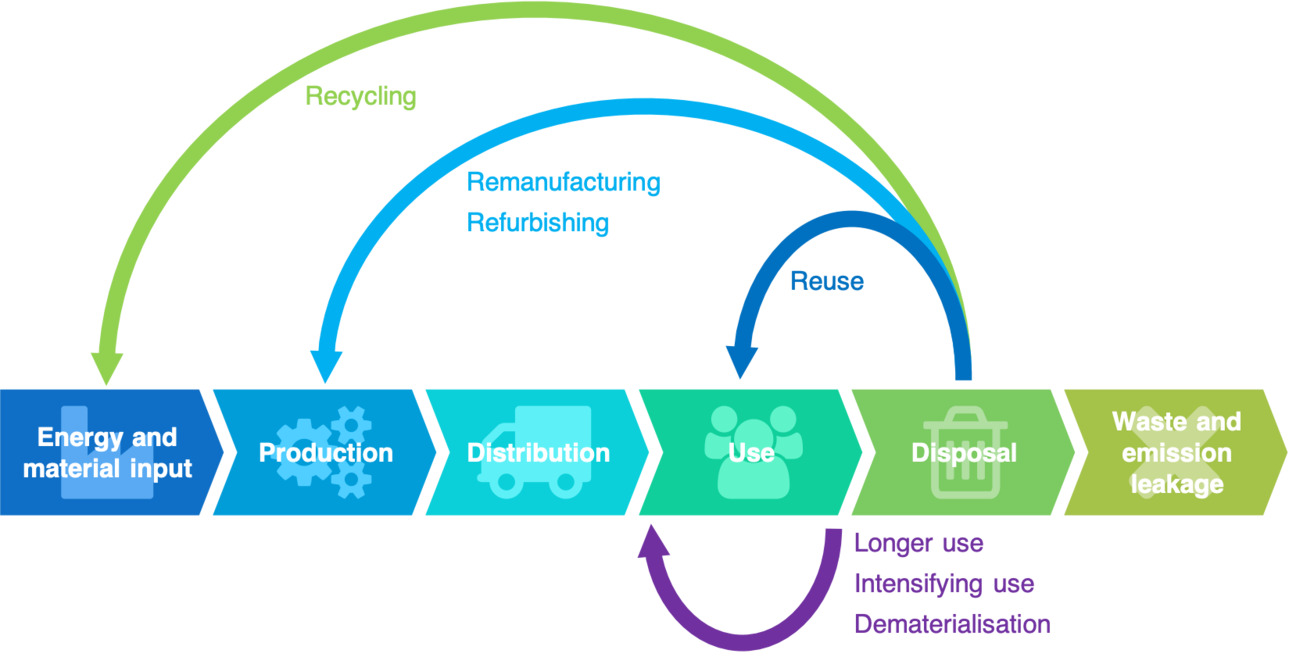Exploring The Meaning of Circular Economy and Its Impact on Business
In today's rapidly changing world, where environmental concerns and resource scarcity are increasingly prominent, the concept of the circular economy has gained significant attention. The circular economy offers a fresh perspective on how businesses can operate sustainably, reduce waste, and maximize resource efficiency.
In this blog, we will delve into the meaning of circular economy and explore its profound impact on businesses.
Importance of understanding the meaning of circular economy
Understanding the meaning of circular economy is important because it is a new production and consumption model that aims to ensure sustainable growth over time. By adopting circular economy principles, businesses can work towards reducing waste, conserving resources, and minimizing environmental impact. This can lead to lower costs, increased efficiency, and new business opportunities. Additionally, as society becomes increasingly concerned with sustainability, knowing and implementing circular economy principles can help businesses stay competitive and relevant in a changing market.
It is important to understand the meaning of circular economy to explore all of its benefits.

The meaning of circular economy
The meaning of circular economy has gained significant attention in recent years as a sustainable approach to economic development.
Definition
The meaning of circular economy aims to minimize waste, maximize resource efficiency, and promote the continuous use and regeneration of materials. Unlike the traditional linear economy, which follows a "take-make-dispose" model, a circular economy seeks to create a closed-loop system where resources are kept in use for as long as possible.
In a circular economy, products and materials are designed to have a longer lifespan, be easily repairable, and have their components readily recyclable. This approach ensures that materials and resources stay in circulation, reducing the need for raw material extraction and minimizing waste generation. By adopting a circular economy model, businesses and industries can contribute to the transition towards a more sustainable and regenerative economic system.
>>>> Learn more at: The Power of Circular Economy System : How does it work?
Benefits of circular economy
The benefits of a circular economy are multifaceted. From an environmental perspective, it helps to conserve natural resources, reduce pollution and greenhouse gas emissions, and minimize the negative impacts associated with resource extraction and waste disposal. Economically, a circular economy can generate cost savings through improved resource efficiency, stimulate innovation and job creation, and enhance the resilience and competitiveness of businesses. Socially, a circular economy promotes access to affordable and sustainable products, fosters community well-being, and supports a more equitable distribution of resources.
By understanding the meaning of circular economy, businesses can not only reduce their environmental footprint but also unlock new opportunities for innovation, increase customer loyalty, and contribute to a more sustainable and prosperous future. It is a transformative approach that aligns economic prosperity with environmental stewardship and social well-being, making it a powerful tool for driving positive change on a global scale.
 Understanding the meaning of circular economy, businesses can unlock new opportunities.
Understanding the meaning of circular economy, businesses can unlock new opportunities.
Impact of Circular Economy on Business
Transitioning from Linear to Circular Business Models
The adoption of circular economy principles requires businesses to shift from traditional linear models of production and consumption to circular business models. This transition involves rethinking product design, manufacturing processes, and supply chain management to optimize resource use, minimize waste, and promote product life extension. By embracing circular business models, companies can enhance their operational efficiency, reduce costs, and create a more sustainable and resilient business model.
Opportunities for Innovation and New Revenue Streams
The circular economy presents businesses with ample opportunities for innovation and the development of new revenue streams. The need to redesign products, explore alternative materials, and implement resource recovery systems opens up possibilities for creating innovative products and services. Businesses can explore opportunities in areas such as recycling technologies, remanufacturing, sharing economy platforms, and sustainable packaging solutions. By embracing these opportunities, companies can gain a competitive advantage, attract environmentally conscious customers, and tap into new markets.
Improved Brand Reputation and Customer Loyalty
Embracing the circular economy can significantly enhance a company's brand reputation and customer loyalty. Consumers are becoming increasingly aware of environmental issues and are actively seeking out brands that demonstrate sustainability commitments. By adopting circular economy practices, businesses showcase their environmental responsibility and commitment to reducing waste and resource consumption. This can result in improved brand perception, increased customer loyalty, and a competitive edge in the market.
Resource Efficiency and Cost Savings
The circular economy encourages businesses to optimize resource use and minimize waste generation. By implementing strategies such as waste prevention, recycling, and product life extension, companies can improve their resource efficiency and reduce costs associated with raw material extraction and waste disposal. This can result in significant cost savings over time and contribute to long-term business sustainability.
Collaboration and Stakeholder Engagement
The circular economy encourages collaboration and engagement with various stakeholders, including suppliers, customers, government agencies, and NGOs. Collaborative efforts enable businesses to leverage shared resources, expertise, and knowledge to drive circular initiatives. Engaging stakeholders also helps build relationships, foster trust, and create a supportive ecosystem for the circular economy. Collaborative approaches can lead to shared value creation, shared costs and risks, and the development of innovative solutions that benefit all parties involved.

Embracing the circular economy can have a profound impact on businesses. It enables the transition to sustainable and regenerative business models, fosters innovation, improves brand reputation, enhances resource efficiency, and reduces costs. By understanding the meaning of circular economy, aligning their strategies with circular economy principles, businesses can position themselves for long-term success in a resource-constrained and environmentally conscious world.
How to embrace a circular economy in your business?
- Conduct a Resource Assessment: Start by understanding the resources your business consumes and wastes throughout its value chain. Identify areas where waste can be minimized, resources can be conserved, and circular practices can be implemented.
- Redesign Products and Services: Adopt a design-thinking approach to create products and services that are durable, repairable, recyclable, and have a longer lifespan. Consider incorporating recycled materials for your product such as coffee biocomposite, rice-based polypropylene,...
>>>> Learn more at: Materials Circular Economy: Transforming Waste into Resources for a Sustainable Future
- Implement Waste Reduction Strategies: Implement waste management systems that prioritize recycling, reuse, and repurposing of materials. Optimize production processes to minimize material losses, implement efficient supply chain practices, and promote the use of renewable energy sources.
- Engage in Collaboration and Partnerships: Collaborate with suppliers, customers, and other stakeholders to close the loop in your value chain. Explore partnerships for material exchanges, recycling initiatives, and sharing platforms to optimize resource utilization and reduce waste generation.
- Educate and Train Employees: Provide training and awareness programs to educate employees about the principles and benefits of the circular economy. Encourage them to adopt sustainable practices in their day-to-day operations, such as waste reduction, energy conservation, and responsible resource management.
By embracing a circular economy in your business, you can drive sustainability, resource efficiency, and resilience while contributing to a more sustainable and prosperous future for both your organization and the planet.
Contact us
AirX, the world’s first carbon-negative bio-materialmade from coffee grounds, is a leading company specializing in the production of bio composite from recycled carbohydrates derived waste, including coffee grounds, coconut husk, husk, and bamboo. We are dedicated to promoting sustainability through the use of eco-friendly materials in their manufacturing process.
We are always here to help and provide the best service possible. If you have any questions or would like to receive advice and feedback directly from our sales staff, please do not hesitate to contact us. You can reach us through:
Whatsapp: +84 969 742 950
Email: [email protected]
We look forward to hearing from you!

